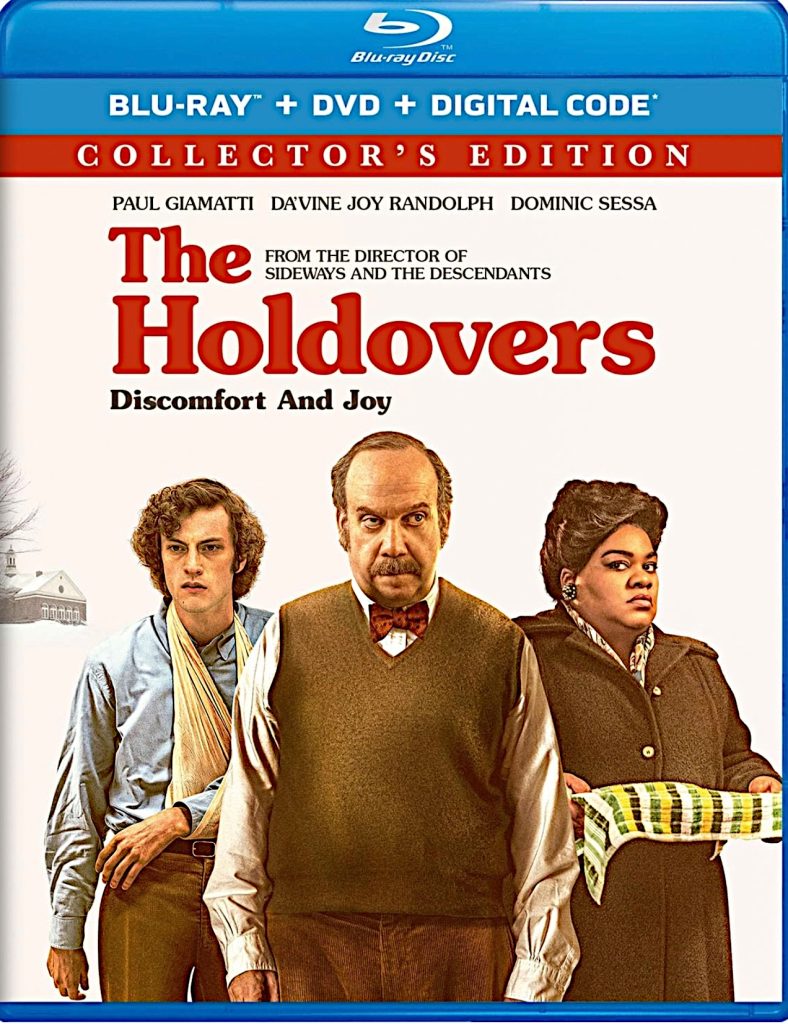…if these poll numbers are repeated and re-affirmed over the next few weeks.




A citizen of Navajo Nation and a teacher of settler colonialism, Marxism and queer indigenous studies, University of Minnesota’s Melanie Yazzie defines herself on her umn.edu web page as follows:

“I’m playing a Sasquatch. In full makeup. In full body hair. No lines — I grunt but no lines.”
Jessie Eisenberg to Variety’s Guy Lodge during the August ‘22 Sarajevo Film Festival, speaking about Nathan and David Zellner’s Sasquatch Sunset, which will debut at the ‘24 Sundance Film Festival. A special screening at the Berlinale will follow.

Lily Gladstone’s Mollie Burkhart is a supporting character — this was clear after Killers of the Flower Moon’s Cannes premiere last May.
Mollie sidesteps traditional definings of lead character behavior at every turn — basically being a passive victim who doesn’t react to murders of family members and the attempted methodical murder of herself except with sullen silences, and who spends half the film in bed as she slowly dies from poisoning.
It’s an under-energized (i.e., dull) performance sans tempest and catharsis.
Gladstone’s Best Actress campaign is first and foremost an identity bandwagon and, not to sound overly harsh, a case of unmitigated category fraud if there ever was one.
But the woke identity celebrationists see this as an historic opportunity to shower Gladstone with love and largesse and thereby symbolically cleanse
themselves of any sort of association or guilt over white Hollywood’s decades of mistreatment or mischaracterizing of Native American culture (as echoed by Marlon Brando during the ‘73 Oscar telecast and the subsequent slagging of the late Sacheen Littlefeather, or something like that).
“The one inarguable thing you’ve said [about] Gladstone is that Mollie is too passive and shoved to the background to be a leading role.” — HE’s own Kristi Coulter.
Pure narrative, pure cultural politics — zero to do with quality of performance.
You can stand me up before the gates of hell, and I won’t back down on this.
…that despite Vin Diesel having sired three kids with Paloma Jiménez, whom he’s been with since 2007…the circuit scuttlebut has been that he’s a bit atypical in the realm of traditional whatevs. All to say I was surprised to read that Diesel is being sued by a woman over an alleged sexual battery episode said to have happened in 2010.
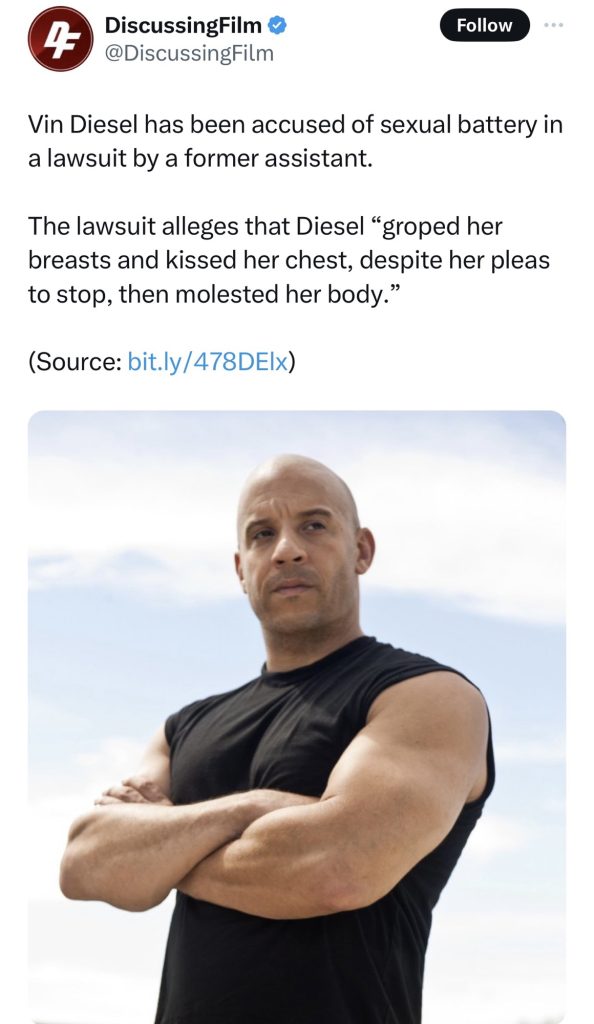
As someone who literally stood in front of that huge oil painting of Tony Montana and Elvira in the spring of ‘83, having snuck onto the Universal sound stage where a large portion of Tony’s gaudy Miami mansion had been built…it only just hit me today that the blink-and-you’ll-miss-it clip of the painting in Scarface is not quite the same as the bullet-strafed photo of same that we’re all familiar with…compare Michelle Pfeiffer’s eyes…they’re gazing in different directions plus her top expression conveys an air of contentment while she looks vaguely sullen and frosty in the alternate. Al Pacino looks chillier also in the below photo.
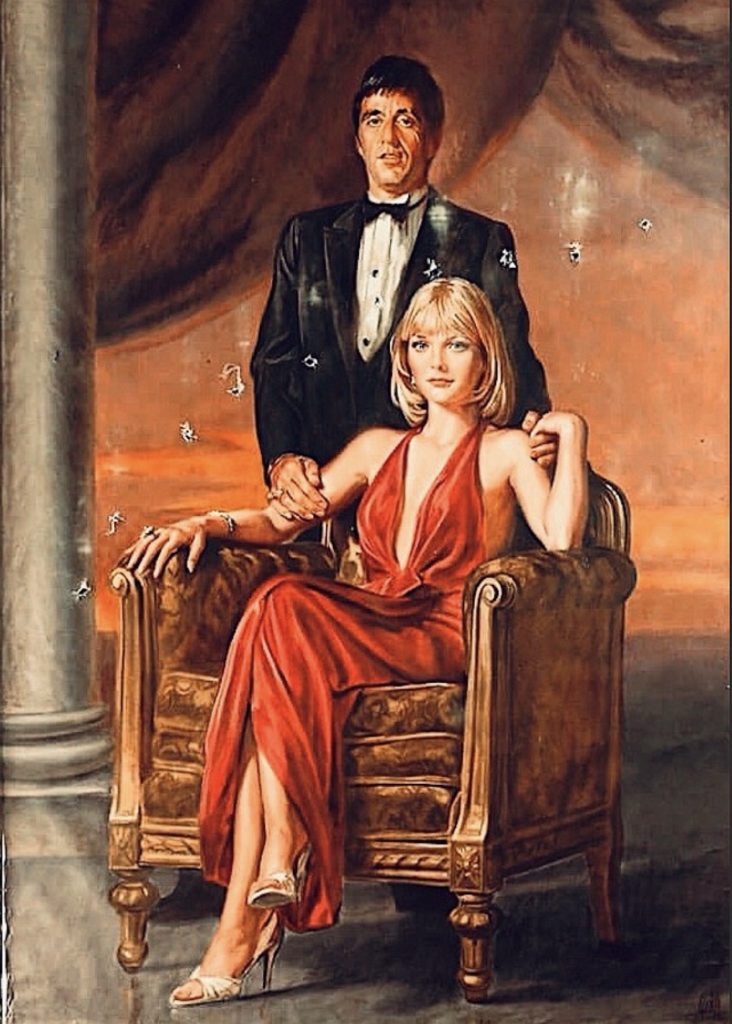
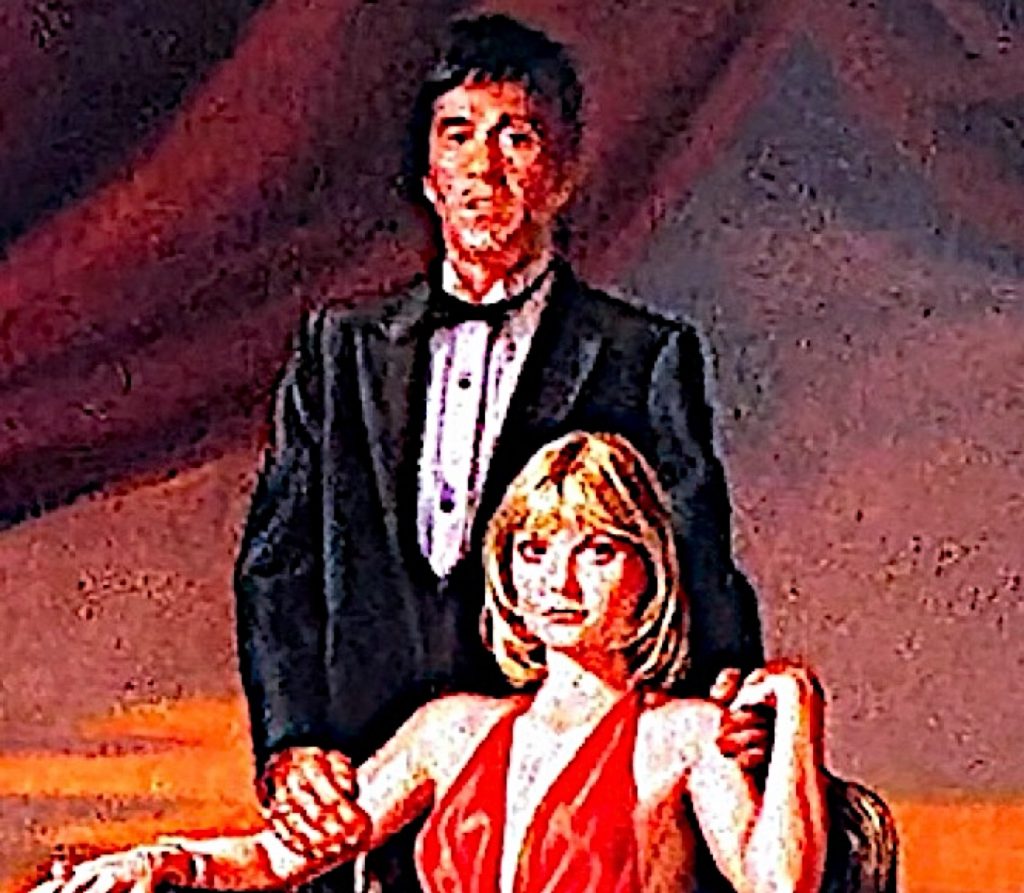
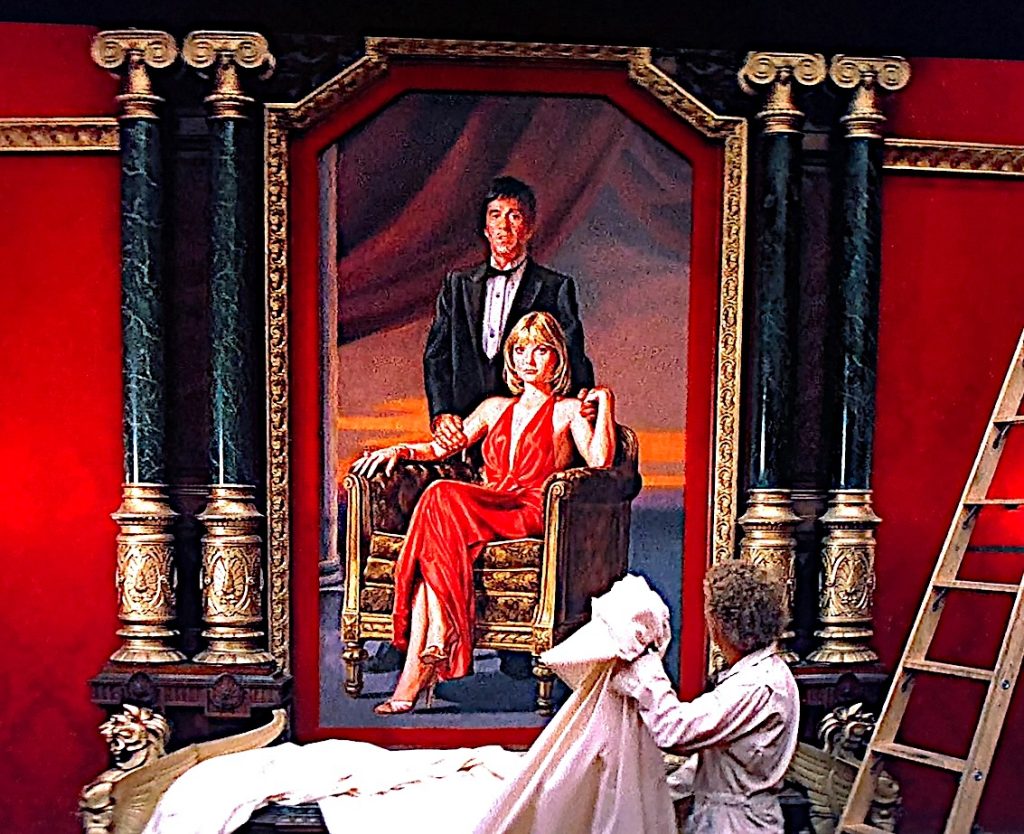
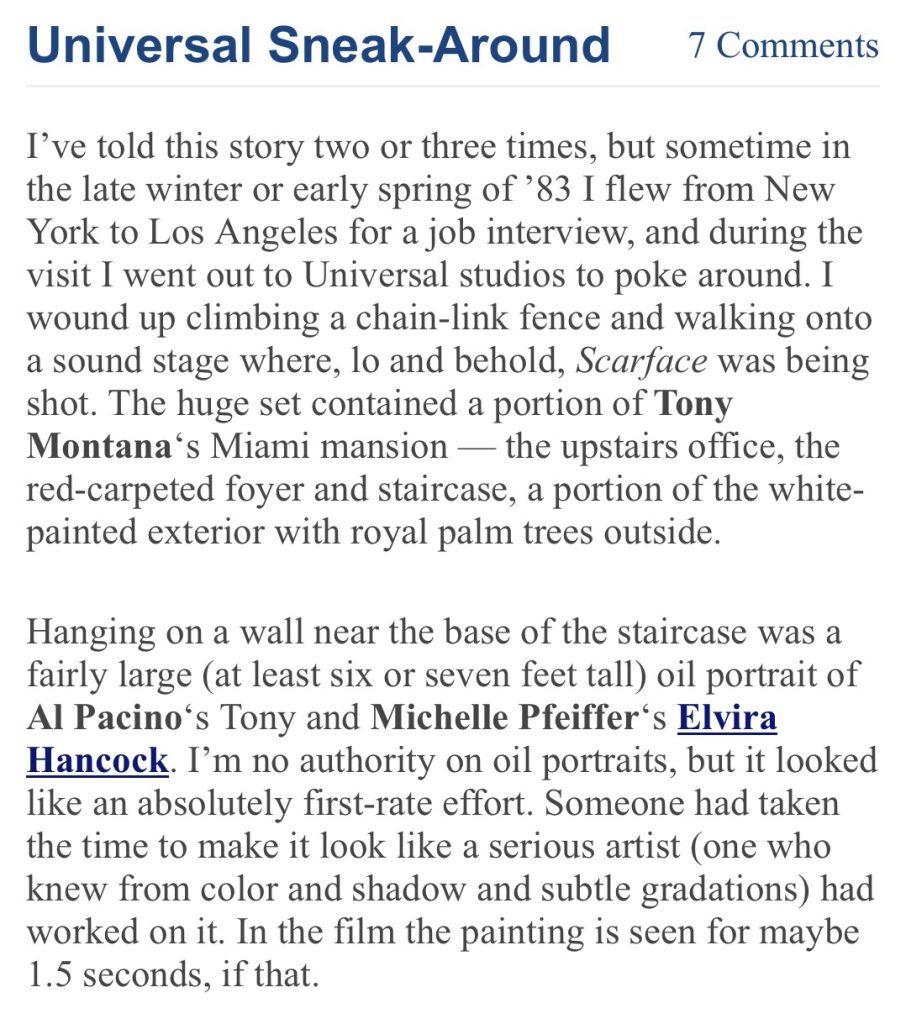
…and it doesn’t specifically matter anyway as we know who’s going to win the Best Actress Oscar, but if we could somehow know what we will never in fact know, who would be in second place, Maestro’s Carey Mulligan or Poor Things Emma Stone?
How great would it be if the actress who could arguably be said to have delivered the finest (deepest, strongest, most fully penetrating) lead performance actually won? Yeah, I know…dream on.

It’s hard not to associate Zelda Williams and Diablo Cody’s Lisa Frankenstein (Focus, 2.9.24) with Yorgos Lanthimos’ Poor Things, which is based on Alisdair Gray 1992 novel but has been more commonly referred to over the last few months as Barbie Meets Frankenstein. Lisa began shooting in August ‘22, or roughly 13 years after the development of Poor Things had begun.
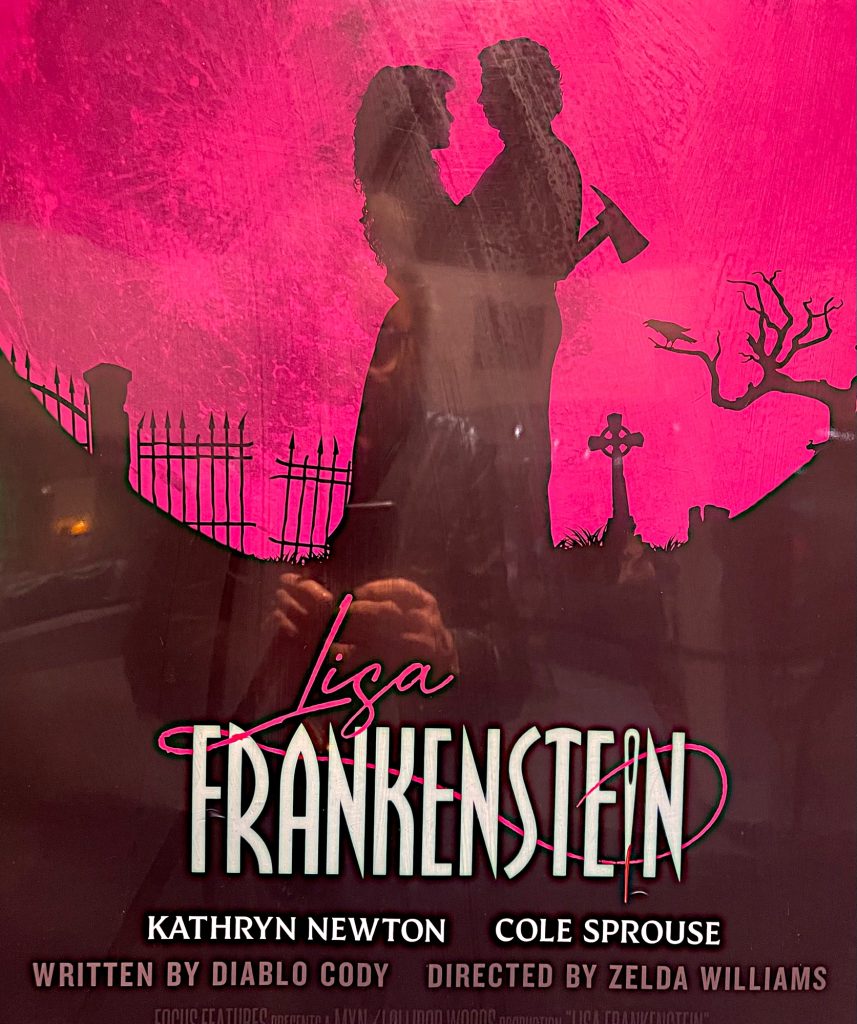
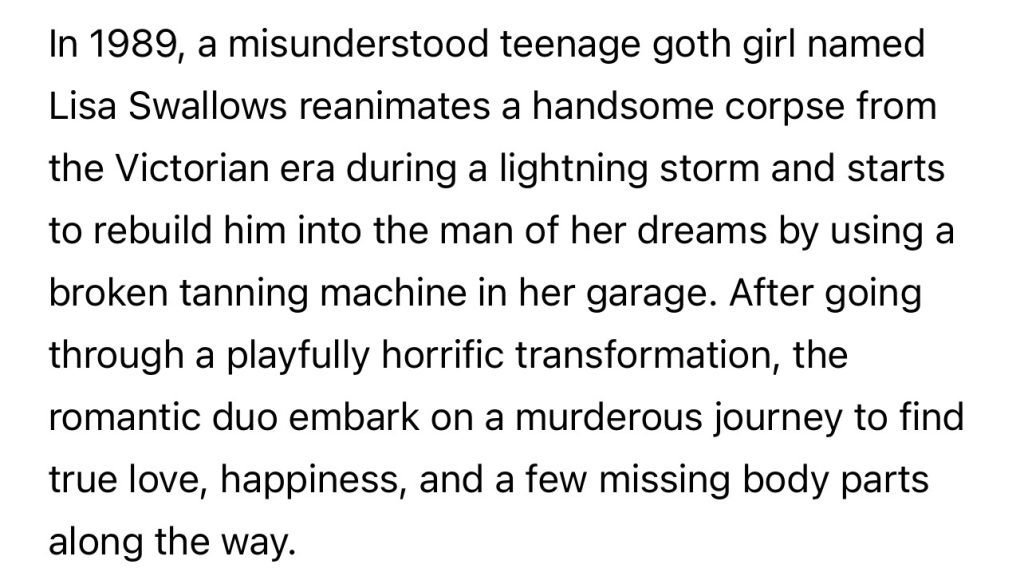
I’ve just stumbled out of Will Gluck’s Anyone But You (Sony, 12.21), and I’m trying to imagine sitting through a more synthetic or robotic Millennial-Zoomer romcom…I wanted to leap into a river of molten lava.
Set on the sunny Australian coast and based on William Shakespeare’s Much Ado About Nothing, it’s about the usual emotional avoidance crap…pretending and faking feelings and putting in appearances and never coming clean until the very end…romantic hokum at its most hellish and soul-numbing.
Anyone But You is a skin-deep farce of the lowest order…slick and precocious…basically like sitting through a ping-pong game…bad for your soul and UTTERLY HORRIBLE…I felt as if I couldn’t breathe.
Glen Powell has that hunky X-factor thing going on, but Gluck and Illana Wolpert’s script is so arch and fizzy and deeply infuriating in the way it flaunts its plasticity, it nearly smothers Powell’s soul…not even a vague semblance of human-like behavior to be found.
Sydney Sweeney’s boobs are bouncy and undeniable, but to me she’s nothing. Okay, she works hard at the physical farce stuff, but she refuses to relax and is constantly “acting.”
There’s more attention paid to Powell’s brawny, bare-chested physique and his butt cheeks (and the butt cheeks of Joe Davidson, playing an Australian surfer dude) than to Sweeney’s boobs or any other female anatomical diversions…it’s basically empty beefcake with a side order of cheesecake.
I’ll tell you one thing — if Powell had been cast in Paul Mescal’s role in All Of Us Strangers, I would have had significantly fewer problems with Andrew Haigh’s film, cum droplets and all.
I was half into the first 10 or 15 minutes of Anyone But You (mostly occurring in a Starbucks-like outlet) but despised the remainder top to bottom.
It basically plays on the same broad farcical level of Ticket to Paradise, that godawful George Clooney-Julia Roberts South Seas comedy (also shot down under).
HE’s alternate ending for The Holdovers: Paul Giamatti’s curmudgeonly history professor isn’t canned but impulsively quits in order to travel to Greece and write his novel…something like that.
Other suggestions?

